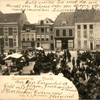Welcome to Hotel Helvetia! Friedrich Wüthrich’s Illicit Mercenary Trade Network for the Dutch East Indies, 1858-1890
DOI:
https://doi.org/10.18352/bmgn-lchr.10740Abstract
Because of limited human resources at home, the Dutch colonial army recruited up to forty percent of its soldiers outside of the Netherlands. This demand for mercenaries opened up a number of opportunities and challenges for non-Dutch European actors in a transnational military labour market. Among those who took advantage of these opportunities was the Swiss Friedrich Wüthrich. Born into a poor family, he first pursued a military career in the Dutch colonial army. Subsequently, he ran the Hotel Helvetia in the Dutch city of Harderwijk where the recruitment centre of the colonial army was also domiciled. From his hotel, Wüthrich set up an illicit recruitment network and lured young Swiss into the Dutch colonial army. By looking at his life, I examine the opportunities that the violence-infused colonial expansion offered to non-Dutch Europeans, and the repercussions that spread into Europe’s hinterland.
Het Nederlandse koloniale leger bestond voor ongeveer veertig procent uit soldaten die uit andere Europese landen afkomstig waren, aangezien het in eigen land te weinig soldaten wist te rekruteren. Deze behoefte aan huurlingen bood een groot aantal niet-Nederlandse actoren tal van mogelijkheden om binnen een transnationale, militaire arbeidsmarkt te opereren. Een van de mensen die daarvan dankbaar gebruik maakten, was de Zwitser Friedrich Wüthrich. Afkomstig uit een armlastig gezin probeerde hij allereerst een loopbaan op te bouwen binnen het Nederlandse koloniale leger. Vervolgens werd hij uitbater van Hotel Helvetia in Harderwijk, waar ook het rekruteringscentrum van het koloniale leger was gevestigd. Vanuit dit hotel zette Wüthrich een illegaal rekruteringsnetwerk op, waarmee hij jonge Zwitsers naar het Nederlandse koloniale leger lokte. Aan de hand van zijn levensgeschiedenis onderzoek ik in dit artikel niet alleen de mogelijkheden die de gewelddadige koloniale expansie niet-Nederlandse Europeanen bood, maar ook de repercussies hiervan op Europa zelf.
This article is part of the special issue ‘The Dutch Empire and Europe. Demands and Opportunities’.
Dit artikel maakt deel uit van het themanummer ‘The Dutch Empire and Europe. Demands and Opportunities’.
Downloads

Published
Issue
Section
License
Authors who publish with this journal agree to the following terms:
a) Authors retain copyright and grant the journal right of first publication with the work simultaneously licensed under a Creative Commons Attribution 4.0 International (CC BY 4.0) that allows others to share the work with an acknowledgement of the work's authorship and initial publication in this journal.
b) Authors are able to enter into separate, additional contractual arrangements for the non-exclusive distribution of the journal's published version of the work (e.g., post it to an institutional repository or publish it in a book), with an acknowledgement of its initial publication in this journal.
c) Authors are permitted to post their work online (e.g., in institutional repositories or on their website) prior to and during the submission process.
Authors are explicitly encouraged to deposit their published article in their institutional repository.








